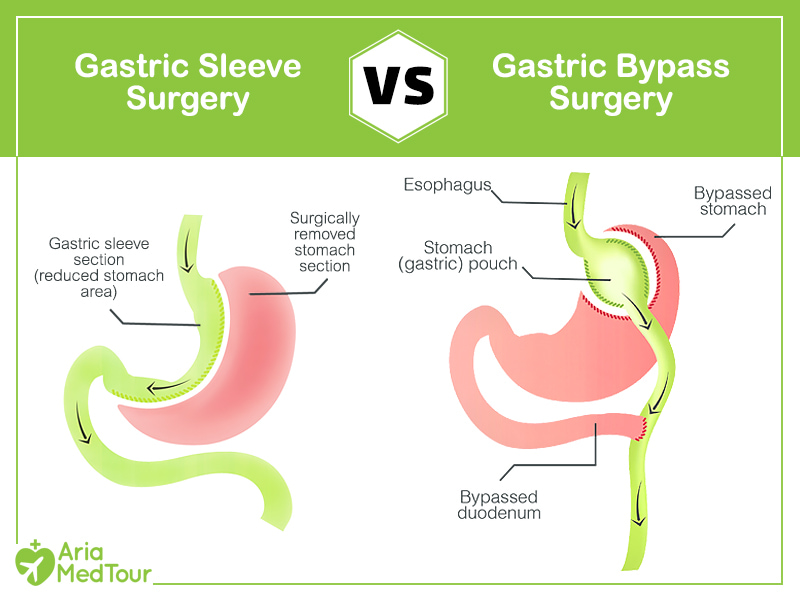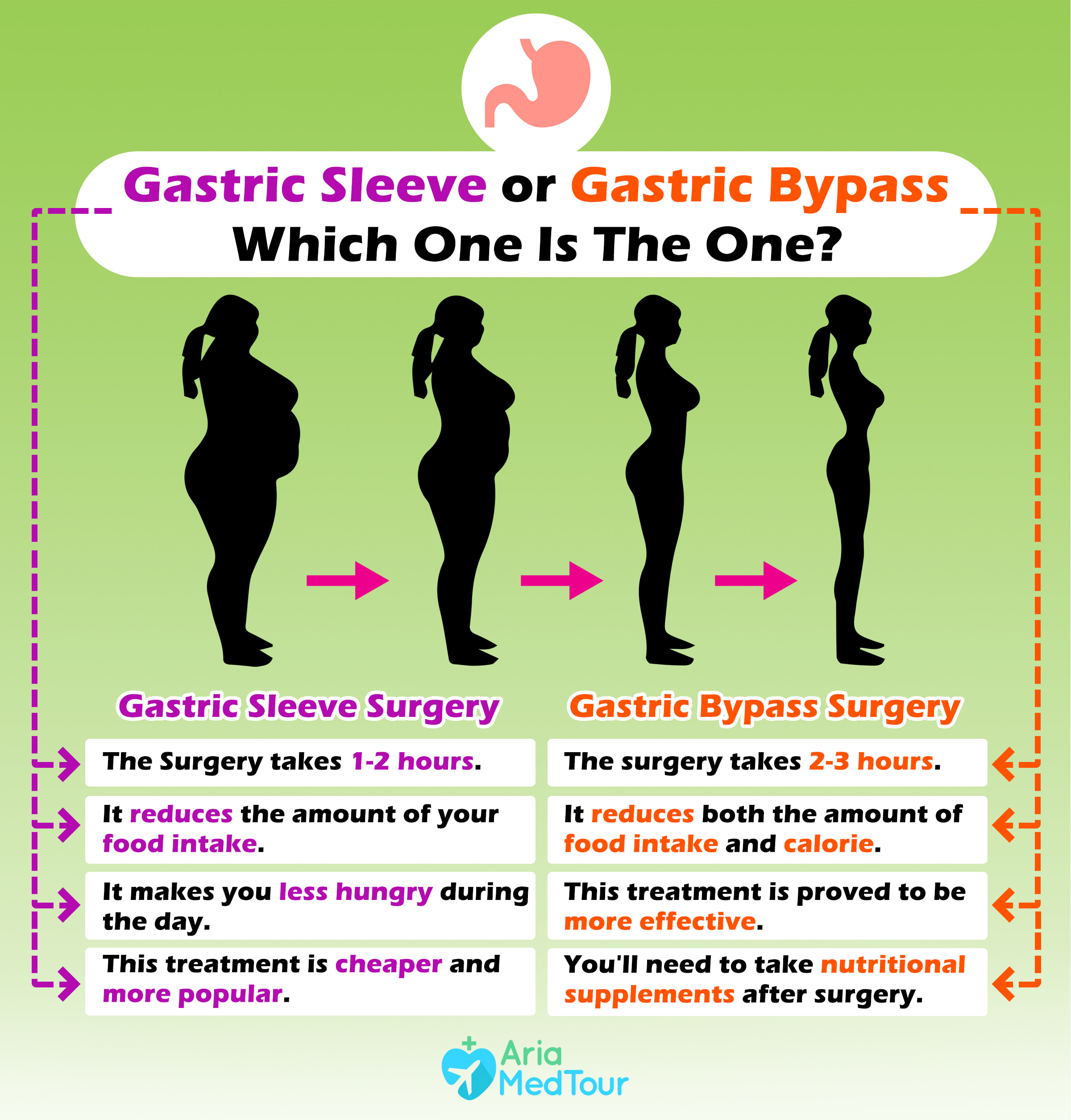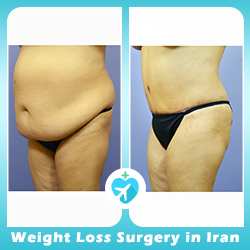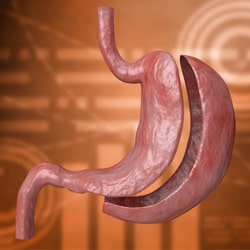If you are reading this post, you probably have decided to lose weight through bariatric surgery. “Gastric bypass” and “gastric sleeve” are among the most popular weight loss procedures. You may have already done some research on the internet to see which one best suits you. However, you might be still hesitating between gastric bypass and gastric sleeve, as both of them have their advantages and disadvantages.
In this post, we are going to draw a fair comparison between gastric bypass vs. sleeve gastrectomy to help you come to a well-informed decision. But before going any further, have a look at some key facts about the two procedures.
| Gastric bypass | Gastric sleeve |
| Gastric bypass makes your stomach as small as an egg-sized pouch. | Gastric sleeve makes your stomach as small as a banana. |
| The surgery helps you to lose about 80% of your excess weight within one year and a half. | The surgery helps you to lose about 70% of your excess weight within one year and a half. |
| The surgery is not reversible. | The surgery is not reversible. |
| Nutritional, vitamin, and mineral deficiencies are probable after the surgery. | Gastric sleeve doesn’t normally cause nutritional deficiencies. |
| The healing process takes about four to six weeks. | The healing process takes about four to six weeks. |
| The surgery is a good choice for obese people with BMI of over 40 to 49.9. | The surgery is suitable for all obese people with BMI of over 35. |
| Gastric bypass surgery has more potential complications than sleeve gastrectomy. | Vertical gastrectomy is a safer, less invasive, and less complicated procedure |
| Gastric bypass provides you with more significant weight loss results. | Gastric sleeve provides the patients with faster weight loss results. |
| Gastric bypass is more difficult and expensive. | Gastric sleeve surgery is a simpler and less expensive procedure. |
An overview of gastric sleeve and gastric bypass surgeries
What is gastric sleeve?
Gastric sleeve surgery (also called sleeve gastrectomy) is a weight-loss operation in which the surgeon removes a major part of the stomach to create a tube-like pouch.
This procedure makes your new stomach as small as a banana, which is about 15 percent of its original size so that you would feel full much quicker than before.
Sleeve gastrectomy also greatly restricts your previous insatiable desire to eat because it removes the part of your stomach where appetite hormone is produced.
The surgery helps you to lose about 70% of your weight within one year and a half.

See what happens to your stomach during gastric sleeve and gastric bypass!
What is gastric bypass?
Gastric bypass surgery involves two parts:
- Dividing the stomach into a small upper pouch and a much larger lower parts
- Dividing the small intestine and connecting its bottom part to the new small stomach pouch.
With gastric bypass, as the name implies, portions of your stomach and small intestine are bypassed, and food goes directly from the egg-sized pouch into your small intestine.
The new stomach restricts your intake and provides you with a quick feeling of fullness after eating a small amount of food. It leads to absorbing fewer calories and nutrients compared to the time before the surgery and hence losing the excess weight. The surgery set the stage to lose about 80% of your excess weight within one year and a half.
What these two bariatric surgeries have in common?
Both sleeve gastrectomy and gastric bypass are among the most common bariatric surgeries that help you to lose weight by shrinking the size of your stomach, whether through removing or stapling a part of your stomach.
Irrespective of their different surgical processes, both of them are not reversible.
The differences between gastric sleeve and gastric bypass
Procedure
The major distinction between sleeve gastrectomy and gastric bypass surgery is that in gastric bypass, the surgeon creates a shortcut for the food route through skipping parts of your stomach and intestine. Such a procedure leads to nutritional, vitamin, and mineral deficiencies. This makes gastric bypass a so-called malabsorptive procedure as opposed to gastric sleeve which is a restrictive procedure (though gastric bypass is a restrictive procedure as well.)
On the other hand, nutrients and calories will be normally absorbed after sleeve gastrectomy, as in this procedure your digestive tract will remain intact. However, the side part of your stomach, including the hunger hormone, is removed. As a result, the new banana-sized stomach helps you to feel full sooner and longer after eating a little amount of food.
Compared to gastric sleeve surgery, gastric bypass is a much more invasive operation. For both gastric bypass and gastric sleeve surgeries, patients get general anesthesia. Gastric sleeve surgery usually takes 1-2 hours, while gastric bypass, which is a more radical procedure, takes about 2-3 hours.
Recovery process
Although sleeve surgery has shorter operating time, the healing process for both gastric sleeve and gastric bypass surgeries is the same. When comparing gastric bypass vs sleeve, patients should know that the recovery timeline is quite similar. For both procedures, it takes four or six weeks to return to normal daily activities after staying at the hospital for 1 or 2 days. In terms of the difference between gastric sleeve and gastric bypass, the main variation is in how the stomach and digestive system are reshaped, but the post-surgery healing period remains nearly identical.
Candidacy
All obese people who are between 16 to 70 years old with Body Mass Index (BMI) of over 40 are eligible to undergo weight loss surgery. Besides, the research supports the benefits of weight loss surgery for patients with BMI 35 to 39.9 who are suffering from serious health problems, including sleep apnea or type 2 diabetes.
Patients with the mentioned criteria could have either gastric sleeve or gastric bypass surgeries. However, the best option is different for each individual and you can go for one of them by comparing the advantages and disadvantages mentioned in this article. Your surgeon may also recommend one of this options based on your health status.
Read more: How to choose the right weight loss surgery?

You are a good candidate for gastric sleeve if your BMI is more than 40.
Side effects and safety
Here we have listed some of the most common side effects of gastric bypass and gastric sleeve surgeries you should know before the surgery.
Gastric bypass surgery side effects:
The most common gastric bypass side effects include the following:
- Gastric bypass surgery may cause a condition called dumping syndrome. It occurs when food enters the first part of your small intestine faster than normal. This condition usually stems from the limited size of the functional stomach because excess amounts of undigested food may be dumped into the small intestine. As a result, the patient may experience nausea, vomiting, or painful abdominal cramps after a meal.
- Gastric bypass surgery could cause nutritional deficiency by limiting the amounts of absorbed calories and nutrients. Nutritional deficiencies may lead to other poor medical conditions such as anemia or osteoporosis. To avoid this, patients should not only have meals with high nutritional value but also take supplements, including vitamins and minerals.
- After gastric bypass surgery, the patient may experience constipation. The patient should avoid granular fiber, which could potentially cause bowel obstruction.
- Substantial weight loss in a short period after gastric bypass surgery could lead to gallstones. After the surgery, all the excess clumps, cholesterol, and some substances harden and form small masses in the gallbladder. In most cases, the condition has no symptom, and it is harmless; however, in a few cases, it may cause severe and sudden pain.
Gastric sleeve surgery side effects:
Compared to gastric bypass, gastric sleeve surgery is a safer procedure and has fewer post-opt side effects. The most common gastric sleeve side effects include the following:
- Although gastric sleeve surgery doesn’t interfere with your natural digestion process, it makes you susceptible to vitamin deficiency as your food intake will be drastically decreased. So, the patients should follow a whole food diet and sometimes may need to take supplements or medications to get the required minerals and vitamins.
- After the surgery, you may experience leakage along the stapled line. The situation may result from poor wound healing or low-quality materials used for stitching during the surgery.
- Just like gastric bypass surgery, after sleeve gastrectomy, rapid and substantial weight loss process could increase the risk of gallstones.
Apart from the above side effects, most weight-loss surgeries, including gastric bypass and gastric sleeve, may be followed by infection, blood clots, bleeding, and adverse reactions to anesthesia. Stomach leakage or breakdown of the staple line is among other side effects that you may face in both gastric sleeve and gastric bypass procedures.
Compared to gastric bypass surgery, vertical gastrectomy is a safer and less invasive procedure with fewer side effects and lower complication rates. The procedure is simpler and carries lower risks for the patient to lose weight.
Popularity
Gastric bypass is well known in terms of the most significant weight loss results and extensive research history. According to the American Society for Bariatric Surgery and the National Institute of Health, gastric bypass is considered as the ‘gold standard’ for bariatric surgery. However, sleeve gastrectomy has been growing in popularity as a less invasive, faster, and less expensive weight loss surgery.

Results
Although the gastric sleeve is a newer procedure, the results of gastric bypass are more significant and long-lasting. Patients who have undergone gastric bypass surgery enjoy long-term and lasting results, even after 20 years. The gastric sleeve provides the patients with faster weight loss results but the amount of long-term weight loss is less than in gastric bypass, though still satisfactory.
On the other hand, sleeve gastrectomy has its proponents for being considerably safer and faster than bypass surgery with less serious side effects after the surgery.
Cost
The cost of weight loss surgery depends on many factors, including your hospital, surgeon, country, and the type of procedure you choose. Gastric bypass surgery cost is usually about 25% more expensive than sleeve gastrectomy because it is a more demanding and challenging procedure for the surgeon.
According to NHS, the cost of gastric bypass surgery ranges from £8,000 to £15,000 in the UK while the price for sleeve gastrectomy is between £8,000 and £10,000. Nevertheless, prices of gastric sleeve and gastric bypass surgery vary a lot from country to country. (You can learn about weight loss surgery price in Iran by giving us a call or sending us a message.)
Diet after gastric bypass vs gastric sleeve
Following a proper diet after gastric sleeve or gastric bypass is crucial for the success of the surgery. Watching your post-op diet not only lowers the chance of developing complications such as vomiting, constipation, and gastric leakage, but it also helps you to correct your eating habits and get the most out of the surgery.
Both gastric sleeve and gastric bypass require somehow the same post-opt regime, but patients who have undergone gastric bypass need to take vitamin and other supplements regularly for the rest of their lives.
Also read: Healthy eating guidelines for the first month after weight loss surgery
Which one is better, gastric sleeve or gastric bypass?
Each bariatric surgery has its benefits and drawbacks. Given the mentioned information, gastric sleeve may be a better option for those with lower BMIs who don’t want to take supplements for good and all. Gastric bypass, on the other hand, have a slight edge over sleeve gastrectomy in terms of the amount of weight a patient loses after the surgery
All things considered, it is up to you to decide which of these bariatric procedures (gastric sleeve vs gastric bypass) is right for you and serves your needs best. If you still are doubtful about choosing the best weight-loss surgery, our consultants at AriaMedTour can help you make the right decision. Contact us now and get a consultation for free.















I appreciated the formatting — easy to skim and still informative.
Thanks for reading dear, and we’re glad it was good for you…
I tried your suggestion and it worked perfectly for me. Cheers!
That was good news dear and thanks for sharing with us…
Great post — concise, useful, and well-presented. Thank you!
Thank you for reading and we are glad that is useful and you have used it dear…
Concise and informative. I learned something new today.
Thank you for your time Kenny.we’re glad you’ve used it dear.
Excellent article — the FAQs section was particularly useful.
Thank you for your comment dear, and we’re glad this section is useful and you’ve used it…
Awesome! Its genuinely remarkable post, I have got much clear idea regarding from this post
Thank you for reading and we are glad that it was useful…
This cleared up a lot of uncertainty — I feel more confident now.
Thanks for comment Heidy. Our gold is to provide clear and realistic articles, and we are glad to shared your opinion with us…
Good read — the key takeaways were especially helpful.
Thank you for reading, and we’re glad it was helpful dear Sergio.
I do not even understand how I ended up here, but I assumed this publish used to be great
So welcome dear! and thank you for reading, and we are glad that is useful for you…
Well-researched and balanced. Appreciate the effort behind this.
Thank you for your comment dear… We are glad that you are reading and sharing your opinion with us
Great article, thank you for sharing these insights! I’ve tested many methods for building backlinks, and what really worked for me was using AI-powered automation. With us, we can scale link building in a safe and efficient way. It’s amazing to see how much time this saves compared to manual outreach.
Thank you for reading, and we’re glad it was helpful dear.